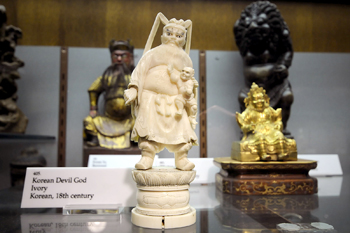Inside Siskin Children's Institute, just a few yards from where kids learn to count and read, sit rare religious antiquities collected over decades by two men committed to understanding the world's largest faiths.
There are rare Torahs, second-century figurines and relics of Buddhism and Christianity on display in the Siskin Museum of Religious Artifacts.
"It's a little-known gem," said Deborah Luehrs, Siskin spokeswoman. "It's one of those things that many people don't know about, but when they see it, they are very surprised that it's so expansive."
All over the Tennessee Valley, tucked in a busy shopping mall, in the ruins of a century-old copper mine and on the site of an early Army post, lie museums that display rare pieces of history. Most charge nothing or just a few dollars to visit, and exhibits range from quirky to priceless.
"We like to think we're the everyman's museum," said Ken Rush, director of the Ducktown Basin Museum, which preserves the history of three communities established around a once-bustling copper mining industry.
"People think copper was just used in pennies, but it was in electrical wiring, which allowed this country to grow and prosper," he said.
The Ducktown museum will host more than 5,000 visitors this year, Rush said. The Siskin museum doesn't closely track visitor numbers, Luehrs said.
Both Rush and Luehrs said their collections offer education and an eye-opening experience.
"The Siskin brothers were devout in their Jewish faith, but they also believed in collecting artifacts from many other religions," Luehrs said.
Mose and Garrison Siskin made their fortune in the steel business. They commissioned an English rabbi, Harris Swift, to scour Europe for religious artifacts after the Nazis were defeated in World War II. Their collection, appraised at $350,000 in 2005, comprises the museum today.
"Rabbi Swift believed that, if you knew why a man worships the way he does, you have a better understanding of him," Luehrs said.
The Ducktown museum preserves the history of a time when mining companies literally owned the cities in which they operated. It shares the history of those towns, but it also discusses the massive environmental damage the mining and chemical industries wrought on the region.
"You get a piece of the industry, but you also see man's impact on the environment," Rush said.
OUR PICKS
• Siskin Museum of Religious Antiquities
In a nutshell: Religious antiquities collected from around the world. The collection, commissioned by Mose and Garrison Siskin, is valued at more than $350,000.
Address: 1101 Carter St., Chattanooga
Hours: 9 a.m.-4 p.m. Monday-Friday, and by appointment
Admission: Free
Information: 423-648-1700
• Ducktown Basin Museum
In a nutshell: The Copper Basin in Polk County was a bustling copper mining community for more than 60 years. The Burra Burra Mine is now on the U.S. National Register of Historic places, and the Ducktown Basin Museum tells the history of that mining community.
Address: 212 Burra Burra St., Ducktown, Tenn.
Hours: 9:30 a.m. -4 p.m. Monday to Saturday
Admission: $4 adults, $3 seniors, $1 children 13 to 18, 50 cents children 12 and under
Information: 423-496-5778
• 6th Cavalry Museum
In a nutshell: The museum preserves the history of the men who fought in the Civil War, the Spanish-American War and World War I. The Fighting Sixth was stationed at then-U.S. Army post Fort Oglethorpe from 1919 to 1942.
Address: 6 Barnhardt Circle, Fort Oglethorpe, Ga.
Hours: 9 a.m.-noon Tuesday-Saturday; 1-4 p.m. Sunday
Admission: $3 adults, $2 seniors, $10 families, no charge for children under 3
Information: 706-861-2860 or www.6thcavalrymuseum.com
• Medal of Honor Museum
In a nutshell: The first four recipients of the Medal of Honor are buried in the Chattanooga National Cemetery, so early organizers thought a hall that paid homage to every recipient of the medal would be appropriate here. Displays focus on several recipients, and there is a listing of every medal winner.
Address: Northgate Mall, Hixson
Hours: 11 a.m.-5 p.m. Monday-Friday; 1-5 p.m. Saturday-Sunday
Admission: Free
Information: 423 267 1737 or www.mohm.org
• International Towing and Recovery Hall of Fame
In a nutshell: The towing industry traces its history back to the earliest days of the automobile, and since the first wrecker was built in Chattanooga, the museum's location is fitting. The museum has many exhibits and a hall to honor those who died while at work.
Address: 3315 Broad St., Chattanooga
Hours: 10 a.m. -4:30 p.m. Monday to Friday; 11 a.m.-5 p.m. Sunday
Admission: $8 adults; $4 children 6 to 8
Information: 423-267-3132 or www.internationaltowingmuseum.org

